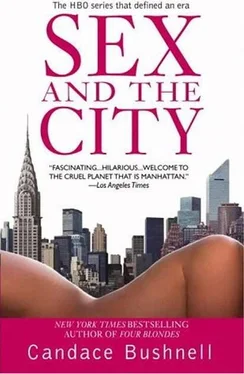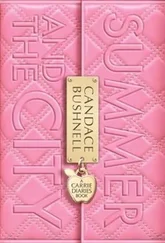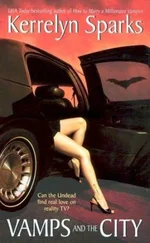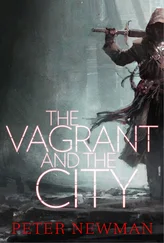Candace Bushnell - SEX and the CITY
Здесь есть возможность читать онлайн «Candace Bushnell - SEX and the CITY» весь текст электронной книги совершенно бесплатно (целиком полную версию без сокращений). В некоторых случаях можно слушать аудио, скачать через торрент в формате fb2 и присутствует краткое содержание. Жанр: paper_work. Описание произведения, (предисловие) а так же отзывы посетителей доступны на портале библиотеки ЛибКат.
- Название:SEX and the CITY
- Автор:
- Жанр:
- Год:неизвестен
- ISBN:нет данных
- Рейтинг книги:4 / 5. Голосов: 1
-
Избранное:Добавить в избранное
- Отзывы:
-
Ваша оценка:
- 80
- 1
- 2
- 3
- 4
- 5
SEX and the CITY: краткое содержание, описание и аннотация
Предлагаем к чтению аннотацию, описание, краткое содержание или предисловие (зависит от того, что написал сам автор книги «SEX and the CITY»). Если вы не нашли необходимую информацию о книге — напишите в комментариях, мы постараемся отыскать её.
SEX and the CITY — читать онлайн бесплатно полную книгу (весь текст) целиком
Ниже представлен текст книги, разбитый по страницам. Система сохранения места последней прочитанной страницы, позволяет с удобством читать онлайн бесплатно книгу «SEX and the CITY», без необходимости каждый раз заново искать на чём Вы остановились. Поставьте закладку, и сможете в любой момент перейти на страницу, на которой закончили чтение.
Интервал:
Закладка:

Introduction
Before Sex and the City was a book and a TV series, it was a column in the New York Observer. This was in the fall of 1994, and I'll never forget the afternoon the editor-in-chief asked me if I wanted my own column. I immediately said yes, and afterwards practically skipped up Park Avenue with joy I had no idea how I was going to pull off this column, but I was convinced that it should somehow be about me and my friends—a group of single women all of whom seemed to have had a never-ending series of freakish and horrifying experiences with men (and sometimes with the same men). We spent hours discussing our crazy relationships, and came to the conclusion that if we couldn't laugh about them, we'd probably go insane.
I suppose that's why Sex and the City is such an unsentimental examination of relationships and mating habits. Although some people find its lack of sentiment and cruel humor disturbing, it's probably only because
the book contains some kind of universal truth. Although the column was originally meant to pertain specifically to New A fork City (hence stories like "The Modelizers" — about two geeky guys who manage to date eighteen-year-old models but end up paying a price), I've found that there are variants of these Sex and the City characters in most large cities around the world. I still haven't decided whether or not that's scary
But most of all, Sex and the City sets out to answer one burning question—why are we still single? Now, with a few years' perspective on the issue, I can safely conclude that we are single because we want to be.
This edition of Sex and the City contains two new chapters, which were written after the book was originally published. And so, at last, the book has a real ending, in which Carrie and Mr. Big break up. Its a bittersweet ending—not just the end of Carrie's relationship with Mr. Big, but the end of her dream of finding the proverbial Mr. Big—a man who doesn't really exist. If you read closely, you'll discover that even Mr. Big himself points out that he is a fantasy in Carrie's imagination, and that you can't love a fantasy. And so we leave Carrie to enter a new phase in her life when she understands that she will have to find herself (without a man), and in doing so will hopefully be able to find a relationship.
Maybe I'm not as unsentimental as I thought.
Candace Bushnell May 23, 2001
1. My Unsentimental Education: Love in Manhattan? I Don't Think So.
Here's a Valentine's Day tale. Prepare yourself.
An English journalist came to New York. She was attractive and witty, and right away she hooked up with one of New York 's typically eligible bachelors. Tim was forty-two, an investment banker who made about $5 million a year. For two weeks, they kissed, held hands—and then on a warm fall day he drove her to the house he was building in the Hamptons. They looked at the plans with the architect. "I wanted to tell the architect to fill in the railings on the second floor, so the children wouldn't fall through," said the journalist. "I expected Tim was going to ask me to marry him. ' On Sunday night, Tim dropped her off at her apartment and reminded her that they had dinner plans for Tuesday. On Tuesday, he called and said he'd have to take a rain check. When she hadn't heard from him after two weeks, she called and told him, "That's an awfully long rain check." He said he would call her later in the week.
He never did call, of course. But what interested me was that she couldn't understand what had happened. In England,
she explained, meeting the architect would have meant something. Then I realized, Of course: She's from London. No one's told her about the End of Love in Manhattan. Then I thought: She'll learn.
Welcome to the Age of Un-Innocence. The glittering lights of Manhattan that served as backdrops for Edith Wharton's bodice-heaving trysts are still glowing—but the stage is empty. No one has breakfast at Tiffany's, and no one has affairs to remember—instead, we have breakfast at seven a.m. and affairs we try to forget as quickly as possible. How did we get into this mess?
Truman Capote understood our nineties dilemma—the dilemma of Love vs. the Deal—all too well. In Breakfast at Tiffany's, Holly Golightly and Paul Varjak were faced with restrictions—he was a kept man, she was a kept woman— but in the end they surmounted them and chose love over money. That doesn't happen much in Manhattan these days. We are all kept men and women—by our jobs, by our apartments, and then some of us by the pecking order at Mortimers and the Royalton, by Hamptons beachfront, by front-row Garden tickets—and we like it that way. Self-protection and closing the deal are paramount. Cupid has flown the co-op.
When was the last time you heard someone say, "I love you!" without tagging on the inevitable (if unspoken) "as a friend." When was the last time you saw two people gazing into each other's eyes without thinking, Yeah, right? When was the last time you heard someone announce, "I am truly, madly in love," without thinking, Just wait until Monday morning? And what turned out to be the hot non-Tim Allen Christmas movie? Disclosure—for which ten or fifteen million moviegoers went to see unwanted, unaffectionate sex between corporate erotomaniacs—hardly the stuff we like to think about when we think about love but very much the stuff of the modern Manhattan relationship.
There's still plenty of sex in Manhattan but the kind of sex that results in friendship and business deals, not romance. These days, everyone has friends and colleagues; no one really has lovers—even if they have slept together.
Back to the English journalist: After six months, some more "relationships," and a brief affair with a man who used to call her from out of town to tell her that he'd be calling her when he got back into town (and never did), she got smart. "Relationships in New York are about detachment," she said. "But how do you get attached when you decide you want to?"
Honey, you leave town.
LOVE AT THE BOWERY BAR, PART I
It's Friday night at the Bowery Bar. It's snowing outside and buzzing inside. There's the actress from Los Angeles, looking delightfully out of place in her vinyl gray jacket and miniskirt, with her gold-medallioned, too-tanned escort. There's the actor, singer, and party boy Donovan Leitch in a green down jacket and a fuzzy beige hat with earflaps. There's Francis Ford Coppola at a table with his wife. There's an empty chair at Francis Ford Coppola's table. It's not just empty: It's alluringly, temptingly, tauntingly, provocatively empty. It's so empty that it's more full than any other chair in the place. And then, just when the chair's emptiness threatens to cause a scene, Donovan Leitch sits down for a chat. Everyone in the room is immediately jealous. Pissed off. The energy of the room lurches violently. This is romance in New York.
THE HAPPILY MARRIED MAN
"Love means having to align yourself with another person, and what if that person turns out to be a liability?" said a friend, one of the few people I know who's been happily married for twelve years. "And the more you're able to look
back, the more you're proven right in hindsight. Then you get further and further away from having a relationship, unless something big comes along to shake you out of it—like your parents dying.
"New Yorkers build up a total facade that you can't penetrate," he continued. "I feel so lucky that things worked out for me early on, because it's so easy not to have a relationship here—it almost becomes impossible to go back."
Читать дальшеИнтервал:
Закладка:
Похожие книги на «SEX and the CITY»
Представляем Вашему вниманию похожие книги на «SEX and the CITY» списком для выбора. Мы отобрали схожую по названию и смыслу литературу в надежде предоставить читателям больше вариантов отыскать новые, интересные, ещё непрочитанные произведения.
Обсуждение, отзывы о книге «SEX and the CITY» и просто собственные мнения читателей. Оставьте ваши комментарии, напишите, что Вы думаете о произведении, его смысле или главных героях. Укажите что конкретно понравилось, а что нет, и почему Вы так считаете.












